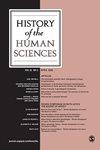托马斯·霍布斯是第一位生命政治思想家吗?
IF 0.5
2区 历史学
Q2 HISTORY & PHILOSOPHY OF SCIENCE
引用次数: 0
摘要
托马斯·霍布斯的名字经常出现在学者们讨论生物权力的历史时,生物权力调节着个体和整个种群的生物生活。本文考察了霍布斯是否以及在多大程度上可以被视为第一位生物政治哲学家。我通过仔细阅读霍布斯的政治文本,并将其与米歇尔·福柯、乔治·阿甘本、罗伯托·埃斯波西托等人提出的一些最具影响力的生物政治理论进行比较,来研究这个问题。霍布斯确实是第一位主张保护生命的最高政治重要性的伟大思想家。此外,这种非沉思生活的突出性不仅限于生存,还寻求让人们幸福。这确实可以让我们认为他是第一位生物政治哲学家,至少在某种程度上是有限的。然而,英国人的生物政治立场缺乏“适当现代”生物政治实例中所见的实践方面。此外,人们的生活在古代就已经受到了根本性的管理。因此,我认为霍布斯的生物政治体系在“生物政治守夜国家”的意义上是最小的。然而,他是“现代性的恰当生物政治时代”的不可否认的催化剂,当时世俗生活和幸福成为几乎所有政治的明确主要对象。本文章由计算机程序翻译,如有差异,请以英文原文为准。
Was Thomas Hobbes the first biopolitical thinker?
Thomas Hobbes's name often comes up as scholars debate the history of biopower, which regulates the biological life of individual bodies and entire populations. This article examines whether and to what extent Hobbes may be regarded as the first biopolitical philosopher. I investigate this question by performing a close reading of Hobbes's political texts and by comparing them to some of the most influential theories on biopolitics proposed by Michel Foucault, Giorgio Agamben, Roberto Esposito, and others. Hobbes is indeed the first great thinker to assert the supreme political importance of safeguarding life. Furthermore, this prominence of non-contemplative life is not limited to mere survival but also seeks to allow for the people's happiness. This may indeed allow us to consider him as the first biopolitical philosopher, at least in some limited capacity. However, the Englishman's biopolitical stance lacks the practical aspects seen in examples of ‘properly modern’ biopolitics. Moreover, peoples’ lives were already governed radically in antiquity. I argue that Hobbes's biopolitical system was, therefore, minimal in the sense of a ‘biopolitical nightwatchman state’. However, he acted as an undeniable catalyst to the ‘properly biopolitical era of modernity’, when mundane life and happiness became the explicit main objects of virtually all politics.
求助全文
通过发布文献求助,成功后即可免费获取论文全文。
去求助
来源期刊

History of the Human Sciences
综合性期刊-科学史与科学哲学
CiteScore
1.60
自引率
11.10%
发文量
31
审稿时长
>12 weeks
期刊介绍:
History of the Human Sciences aims to expand our understanding of the human world through a broad interdisciplinary approach. The journal will bring you critical articles from sociology, psychology, anthropology and politics, and link their interests with those of philosophy, literary criticism, art history, linguistics, psychoanalysis, aesthetics and law.
 求助内容:
求助内容: 应助结果提醒方式:
应助结果提醒方式:


